Writer Joshua Saxon has assembled a funny and deeply engaging science fiction epic with his crowdfunded adventure series, Milky. Saxon employs some deft comedic execution as the book explores how the denizens of fictional UK suburb Crafton Hill cope with each other and a catastrophic alien invasion disrupting their day-to-day shenanigans. Following the successful Kickstarter funding of the second issue, I was very pleased to have an opportunity to discuss the inspiration and intentions surrounding Milky’s development with the creator.
ComicAttack: For the ComicAttack audience who may not be familiar with your work, what can you tell us about your background and how you got into making comics?
Joshua Saxon: I started my career as a newspaper reporter 15 years ago, so I’ve always been telling stories in some form or another. Unfortunately, none of them featured big, scary aliens… Comics felt like the best medium to tell stories that I wasn’t able to with the limitation of needing to be factually accurate.
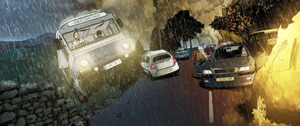
CA: Who is Vikinder for you? Where did he come from and what made his story so compelling for you?
JS: I wanted to create a character that spends a lot of the story suffering. A guy that has a simple dream but is made to feel worthless by the people around him. Stories of characters overcoming very human problems to win the day have always appealed to me more than superpowered musclemen (although I do love those stories too). Dev Patel in Slumdog Millionaire was a big inspiration. That character goes through hell in that film so you’re really rooting for him in the end.
CA: The town of Crafton Hill certainly has a colorful cast of characters. Was the ecosystem inspired more by personal experiences and interactions, or was the composition based around narrative execution and having the pieces you needed to tell the story?
JS: Some characters are inspired by real people from my time as a local journalist. You meet a lot of real-life characters as a reporter and you’re not looking at them from inside a bubble as we tend to today due to social media. This cast of characters don’t get on, but I wanted to put them in a situation where they’re forced to try to understand each other in a Breakfast Club kind of way.
CA: I’ve always appreciated a comedic approach to science fiction, and in Milky you mine some recognizable tropes and archetypes to pretty hilarious effect. Do you feel comedy lets you kind of slip inside the audience’s guard to deliver that social commentary haymaker?
JS: You might be onto something there. Ultimately, I want to tell an entertaining story that makes people think without ramming it down their throats. If there is social commentary to Milky, it’s, “Wouldn’t it be cool if we didn’t base so many decisions on fear and anger and tried to understand where each other is coming from?” I think without humour, that might have been a bit on the nose. But also, all my favourite stories feature humour. Even The Godfather is funny (“Leave the gun; take the cannoli!”)
CA: The character Lucy seems to also break some of our expectations of the genre, but in ways that are very grounded and relatable. Has she evolved during story development, or did you always have a very clear idea of how subversive she should be?
JS: All the characters in Milky are afraid of something. Lucy isn’t your typical damsel in distress in that she’s not really afraid of the villain, she’s afraid of being alone and that she might turn to a villain for company. The character has evolved quite a lot. She started out as the thing Milky wants (to ask out for a drink) but not necessarily what he needs (to build some self-esteem). But a simple “princess trapped in a castle” isn’t really my style or that interesting. Lucy goes through hell in this story, but she certainly doesn’t take it lying down.
CA: What character has surprised you the most with how much they’ve changed as you’ve built out the narrative?
JS: Probably Jim, Ghost’s stepdad. In the early draft, he simply served as the reason why Ghost didn’t like himself and felt like he wasn’t good enough. But Jim became more of a supporting character when I realised he also has a secret fear that drives his shitty behaviour.
CA: We have all heard from folks who say politics and social issues have no place in their entertainment, but as someone who tackles issues of race and sexism pretty openly, do you feel those readers have fundamentally missed the point of the art?
JS: I once read that art is a mirror for the soul. I believe the best stories aren’t escapism, but should actually make us look inwardly while we’re being entertained. I’m not taking much of a political stance in this story, more just showing that everyone has pain, fear and anger that motivates their decisions and that we’d do better to consider why other people feel that way rather than jump to an “us and them” slanging match on Twitter. I reckon it’s better to focus on highlighting and creating the kind of stories you do like rather than trying to tear other people down.
CA: Are comics, film, television and gaming cultural forces that have transformative value as media, or should they be considered static, affirmative reflections of the status quo?
JS: Transformation is essentially what a story is to me. Good stories ultimately have an idea at their core. Usually something along the lines of “If you behave like this, then that happens. But if you learn from your mistakes and do the hard thing, it might all work out.” With that in mind, stories are inevitably going to change with the times and at least reference what’s going on in the world today. I have a suspicion that’s why it’s taken so long to get a new James Bond film up and running. There’s a lot about that character that simply wouldn’t fly with today’s audiences and I’m excited to see how the franchise evolves.
CA: As someone who likes to sprinkle in pop culture easter eggs and homages throughout your work, what properties have you drawn the most inspiration from?
JS: A few people have compared Milky to the films of Edgar Wright. I’m not sure I would have written a sci-fi comic book set in a sleepy English village if they hadn’t done it first in Shaun of the Dead, Hot Fuzz and The World’s End. Star Wars is another inspiration in that Luke was just a farmer at the beginning of that story. You know he has to go up against the Empire, but how does a farmer stand a chance? A milkman is even less qualified for battling aliens, but the reason Milky is the hero will make sense in the end.
CA: Your blog on the Milky website chronicles your approach to dealing with the difficulties of being an indie comic creator. Where some consider “paying dues” through trial and error to be a right of passage, you seem to want to help your peers avoid pitfalls wherever possible. Do you feel a responsibility to “give back” to other creators in that way?
JS: I actually wrote a guest post for Geek Native about why failure is an important part of creating, so I do agree that trial and error is a right of passage. What I’ve written about the struggle really just comes back to telling relatable stories. It’s how I was feeling at the time and I thought, “I bet there’s some other comic book writers feeling like this,” so I started scribbling it down. I didn’t put much more thought into it than that, but the comments and feedback the posts have received saying it made people feel better to know they’re not alone has been one of the highlights of this whole experience.
CA: What is the most impactful lesson you’ve been able to take away from working through a platform like Kickstarter? What’s that one concept that underlies every other consideration with crowdfunding, if there is such a thing?
JS: The most successful crowdfunding creators are prolific. They have already built an audience and focus on delivering as much value to their fans as possible. The most-funded Kickstarter comics all started as webcomics first, so when it came time to crowdfund the printed version, they already had a fanbase ready to pay for a premium product. I’m not quite confident enough in my drawing skills to be putting out free comics yet, and I certainly couldn’t afford to pay a team, so right now I’m blogging about my experience and trying to entertain backers with silly updates. Hopefully they’ll stick around!
CA: Are you working on any other projects that you’d like to see crowdfunded? Are you looking to retain that freedom going forward, or are you interested in linking up with an established publisher?
JS: To quote my bucket list, “get a comic book published” was the main objective here. I actually have a deal with UK publisher Markosia once all four issues are completed. It’s a profit share deal, so I’m really excited to see whether Kickstarter or traditional publishing (or a combination of both) works best. The next project I’d like to try is a one-shot story that I want to offer for free, then perhaps crowdfund a print version before deciding if it makes sense to pitch to a publisher as well. Freedom is important to me, but I’m more interested in making a project as well as I can, moving on to the next one and making that better than the last.
CA: Creators tend to be huge fans in their own right. Is there any book under a major or indie imprint that you’d love to work on, or maybe creators you would like to collaborate with in the future?
JS: Spider-Man! Is there a superhero you care about more than the guy that’s late for school, gets fired, dumped… and can’t tell anyone why? Plus he does it all while throwing zingy one-liners around. In terms of other creators, my favourite artist is Gabriel Rodriguez for his work on Locke and Key. His art on that book is fun, emotional and dark all at once and those are the kind of stories I want to tell.
CA: Just to wrap up, as a personal touch for our audience:
What are you reading?
JS: The Amazing Spider-Man, Outcast, 100 Bullets and Tina Fey: Bossypants.
What are you watching?
JS: The Boys, Dave Chappelle: Sticks and Stones, Avengers: Endgame once it arrives (probably on a loop)
What are you listening to?
JS: Spider-Man: Far From Home soundtrack, Post Malone, The Roots
As always, we at comicattack.net would like to thank Joshua Saxon for taking the time to answer our questions and connect with our readers. If you’re interested in some offbeat, witty science fiction check out our review of Milky #1 and #2 here. Milky is available now via Kickstarter and Comixology.

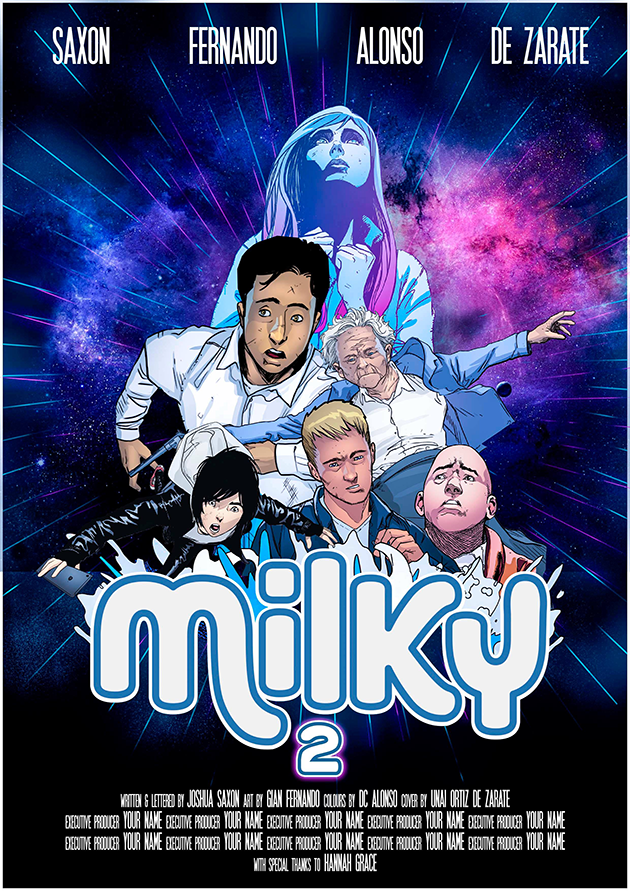

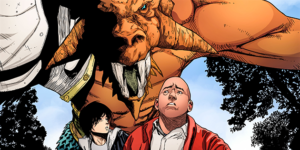
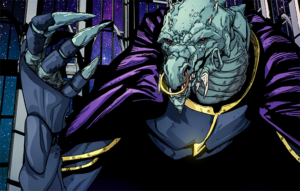
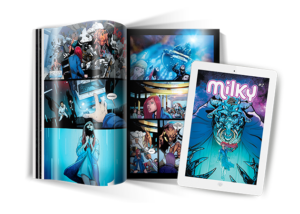

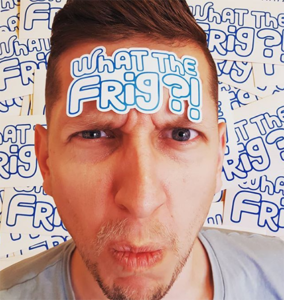
Pingback: Indie Reviews: Milky #3 – ComicAttack.net